TEO’s Charlene Sharkey visits St Peter’s Immaculata YC Planned Interventions Programme (PIP)
TEO’s Planned Interventions Programme funds community activity to divert young people from anti-social behaviour and to deal with heightened tension around interfaces.
In 2021/22, there are currently 110 groups delivering Planned Interventions Programmes within their communities administered by the Education Authority.
At the end of July 2021, Charlene Sharkey visited St Peter’s Immaculata Youth Centre located in the Lower Falls area of West Belfast. St Peter’s is currently delivering five Planned Interventions projects to approximately 50 young people aged from 14-25 years.
“The group I visited consisted of 10 young men aged from 14-19 years and I had the opportunity to assist with one of their social action projects - a clean-up of an alley way at John Street and the repainting of a few defaced electrical boxes within their local community.
“The morning started out with a typical downpour, however, this did not dampen the boys’ spirits, instead it only made them more determined to get started and stuck into the clean-up.
“The next few hours involved the group working tirelessly, removing waste materials/rubble, weeding, brushing up and painting over the electrical boxes.

“It was just so lovely to witness residents from the homes backing on to the alley coming out to thank the boys for their hard work. It was also great to observe the pride the group took whilst undertaking the clean-up ensuring that not even an inch of area was missed.
Quote from Stephen Hughes, Youth Worker in Charge
“If given the opportunity the young people can provide a positive contribution to their community as evidenced with this group.
“We have also seen a significant reduction is ASB in the community due to the summer diversionary activities provided through the programme.”
“It’s not just all work and no play though on the Planned Interventions Programme, the group had worked up that much of an appetite it was only fair they got to enjoy a well-deserved McDonalds for their lunch!
“As well as social action projects, the group have had the opportunity to participate in high adrenaline activities such as Lets Go Hydro, electric motor biking etc. which I feel is very well deserved after all the good work they have done within their community.
“I really enjoyed my time with the group, assisting with their project and getting to know the boys.
“I would like to acknowledge the hard work of their Youth Leader in Charge, Stephen Hughes, for his dedication and commitment in delivering many programmes which benefits the lives of so many at risk young people.”
Charlene Sharkey
GR, FICT and T:BUC Camps

Gilford Youths celebrate “Making a Difference”
An event has been held to celebrate the achievements of 10 young people from the Gilford area of County Down who completed their “Making a Difference Project 2020”.
The ‘Making a Difference’ Project, funded by The Executive Office and delivered under the Planned Interventions Programme as part of the wider Together: Building a United Community (T:BUC) Strategy, is focused on young people in interface areas and areas where there is the potential of unrest during the summer period. The Programme aims to improve attitudes between young people who come from different community backgrounds, and reduce incidents of anti-social and risk taking behaviour by young people.
The Project involved 10 young men (aged 14-16 years) participating in 12 sessions over a five week period, combining informal education opportunities with diversionary activities. These included:
- Team building
- Diversity workshop exploring perceptions, prejudice and stereotypes
- Be Positive training (facilitated by PIPS Hope and Support)
- PSNI question and answer session
- Mountain biking
- Night Safe workshop, and
- Coasteering and rock climbing
The outcomes of the project included an increase in mutual understanding among participants, and an increased self-awareness and appreciation for the concept of community safety.
Speaking following her attendance at the celebration, Charlene Sharkey, TEO’s Good Relations & T:BUC Division, said:
“It was a privilege to take part in the celebration event for the young people from Gilford Youth who participated in the ‘Making a Difference Project 2020’, part of the Executive Office’s Planned Interventions Programme. I would like to say well done to all involved and wish each one of them all the best in the future.”
Due to the current covid-19 pandemic limited programmes are currently being delivered, with group numbers restricted to a maximum of ten participants. Groups adhered to Public Health Agency advice throughout all aspects of their programmes.
Despite the current pandemic it has been encouraging to see so many groups delivering under the Planned Interventions Programme, with 91 groups delivering projects in their local areas.
TEO would like to pay tribute to the hard work and dedication of The Education Authority who administer the Programme, and group leaders for their commitment in delivering the Programme to date.
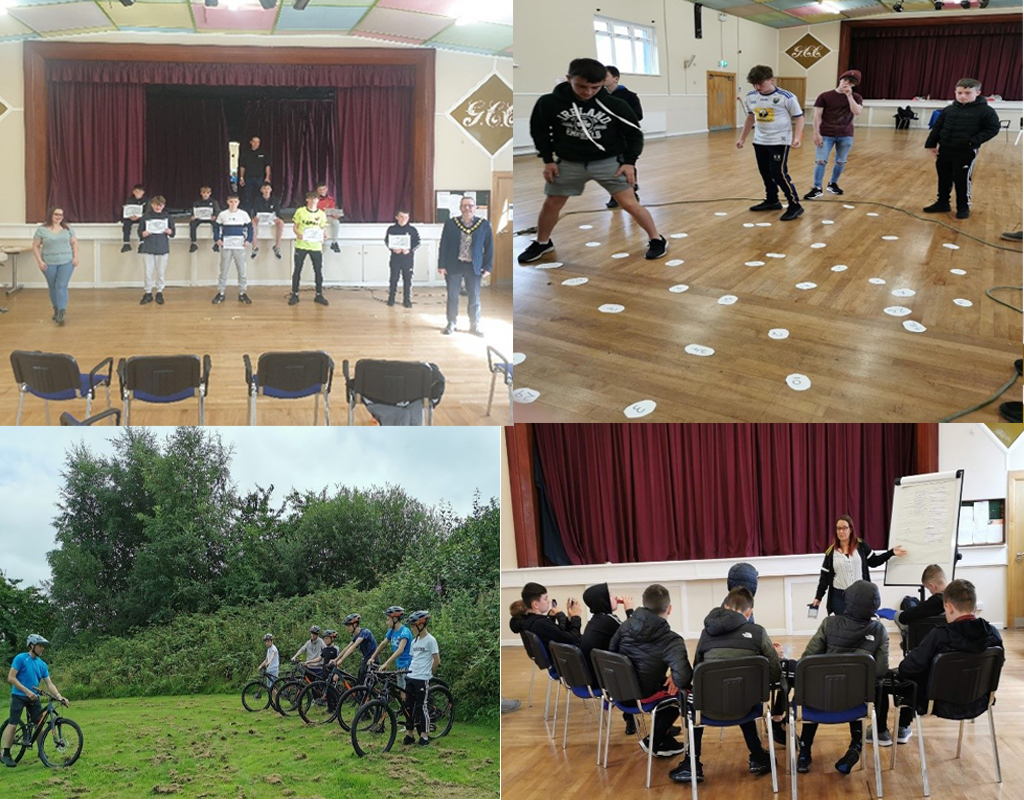
Lagmore Youth Project - Planned Interventions Programme 2020/21
Delivery of Planned Interventions projects continued during the Covid-19 pandemic with groups adhering to social distancing guidelines and being much more innovative in planning and delivery. There were 91 projects delivered in 2020/21.
Lagmore Youth Project
The Lagmore/Mount Eagles area (West Belfast), traditionally sees an increase in crime and anti-social behaviour around the summer months. Of the 131 ASB incidents reported to the PSNI from April-December 2019, 56 of these took place during the summer months. It is widely acknowledged young people from the area are travelling to the nearby interface at Barnfield where they are engaging in increased levels of ASB and risk taking behaviours.
Lagmore Youth Project partnered with Mount Eagles Lagmore Youth and Community Association, PSNI, local political leaders and other statutory bodies identified the most at risk local young people. Together they planned and delivered an engaging programme of work, funded through the Planned Interventions Programme that was low-risk and adhered to social distancing guidelines. 10 young people participated in the programme aged between 14-19 years.
“PSNI have worked alongside Lagmore Youth Project to identify and target high risk young people involved in Anti-Social Behaviour in the areas of Mount Eagles, White Rise and Barnfield Road”
Sgt. Fiona Rogan PSNI
“By engaging with those at greatest risk and with the small numbers because of COVID19, we had a huge impact on reducing the group members’ risk-taking behaviour. We showed the young men alternative ways to productively use their time without having to engage in anti-social behaviour”
Colm Fanning, Programme Youth Worker
Throughout the programme project leaders used key opportunities to explore issues of cultural identify and awareness of others through a programme of dialogue and self-reflection. Group discussions/debates around issues such as bonfires, immigration, flags, cultures and a divided society were undertaken.
Participants in the programme also enjoyed fun activities such as attending a drive in cinema as well as a socially distanced camping experience using individual tents and trying out new activities such as fishing. Many had never been on a residential before and thoroughly enjoyed this experience.
Baseline questionnaires are completed by each participant both at the start and again at the end of the programme. Through comparison of these questionnaires we will be able to gauge the distanced travelled by each young person from participating in the programme.
As you can see from the photos, the participation of the young people was excellent and it motivated them to sign up for the T:BUC Camps programme that took place at the end of summer 2020.
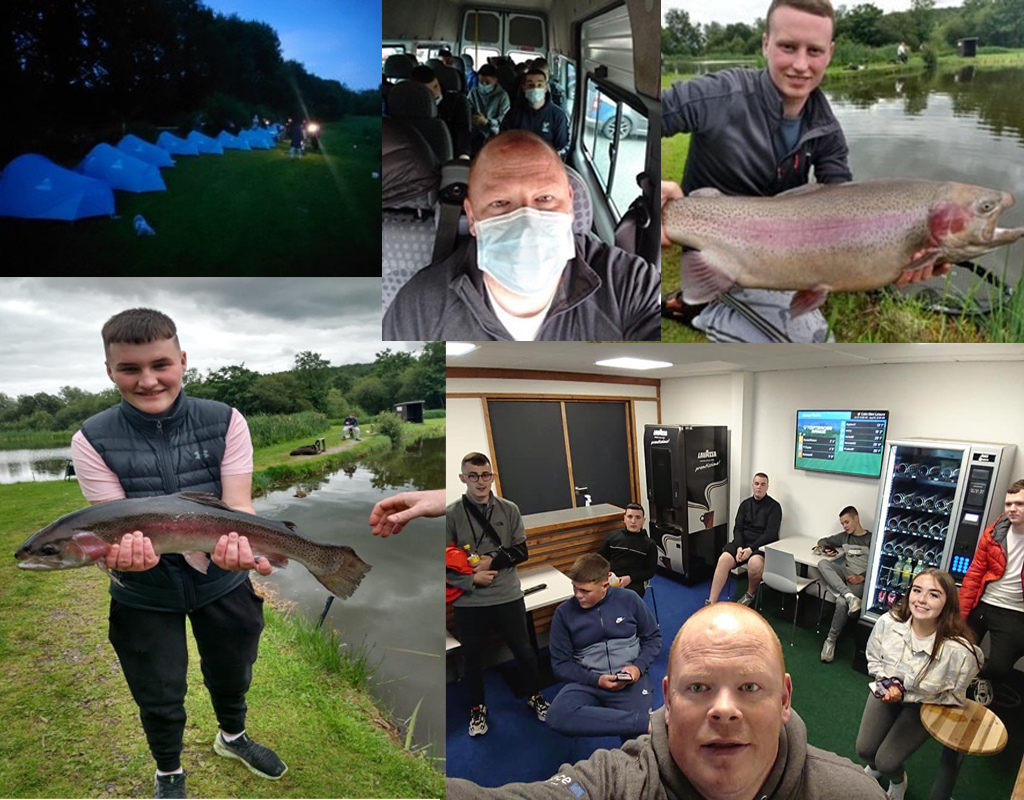
TEO’s Youth Engagement Programme a welcome diversion in North Belfast
Ten young males from the New Lodge area have taken part in The Executive Office’s Youth Engagement Programme.
The New Lodge is an area in North Belfast which borders a number of interfaces. For a number of years there have been difficulties with anti-social behaviour including stone throwing and arranged fights which has increased during the summer months.
The participants recruited to the diversion programme had been identified as being involved in the vandalism and anti-social behaviour that had been occurring in the area.
Due to this activity they had built up a negative reputation within the local community and were not involved in youth services, were barred from other youth centres, and had been regularly involved in risk taking behaviours for some time.
The young people were recruited through an outreach process that involved workers from the local Artillery Youth Centre meeting with their parents.
The youth workers knew many of the participants’ families and had worked with their older siblings over the years and felt this would be beneficial in assisting them to engage with this hard to reach group.
The Youth Engagement Programme engaged with the group in a participative manner that allowed them to have a say in the work they would be involved in.
The group members took part in activities including:
- outdoor team building exercises in the Mourne Mountains and North Coast
- outdoor education
- a session on the impact of anti-social behaviour
- a community relations session, and
- a community clean-up of the area around what is locally known as the ‘Seven Hills’, an area that has been affected by anti-social gatherings.
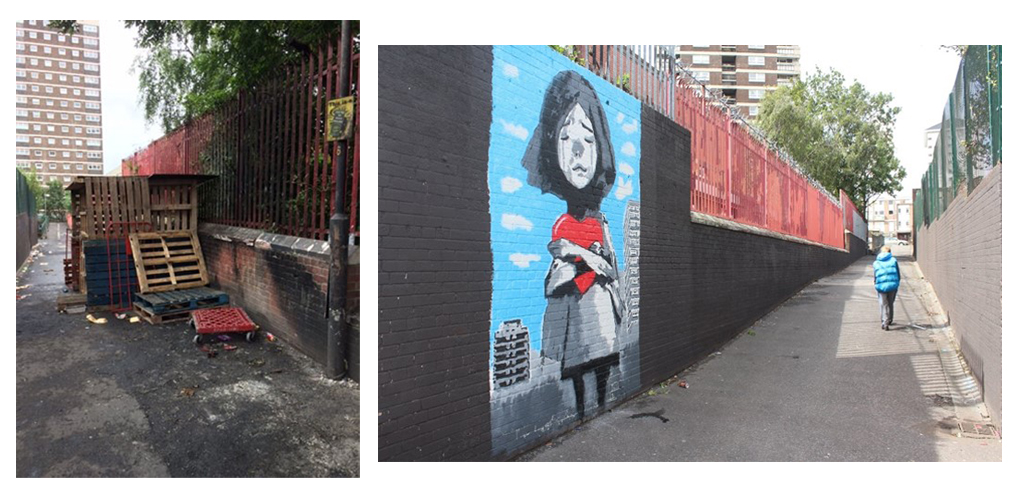
The main part of the programme involved a major community clean-up of railings and walls that had been covered in graffiti and vandalised over a sustained period of time.
The two youth workers planned and delivered a programme that had a major impact on the local area and also changed the perception of the young people.
Participants learned the value of becoming positive members of the local community and the importance of improving the environment for all residents.
The group of young people also got to see first-hand the positive impact they had made in their community and clearly enjoyed the praise from local residents. At one point an older resident brought the group some food to thank them for the work that they had done for the community.
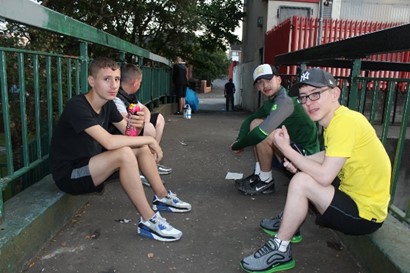
One of the Staff members managing the project commented:
“The Planned Intervention funding enabled us to plan and develop a piece of community relations work that had a massive impact on the New Lodge community and it let local residents see the young people as part of a solution, not the problem.”
Charlene Sharkey, from TEO’s T:BUC Camps & FICT Branch said:
“It is great to see a project like this, funded by the T:BUC Strategy, really making a difference to young people, and the community they live in.
“It shows how successful Planned Interventions can bring people of all ages together, and provides learning and good practice for our projects to consider when delivering similar programmes.”
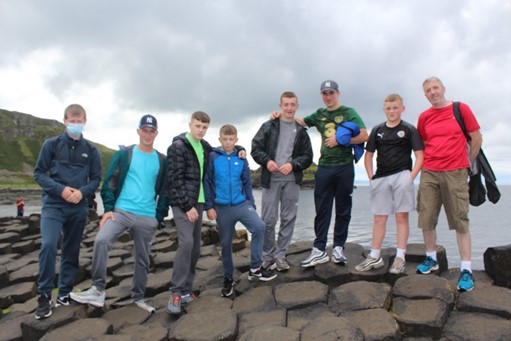
If you would like to find out more about the Planned Interventions Programme, information is available via the link below:
TEO supports Portadown YMCA young people in exploring identities, culture and traditions
Ten young people between the ages of 11-14 from the Portadown area have participated in “Emerge”, a diversion project delivered by Portadown YMCA under The Executive Office’s Planned Interventions Programme.
The Planned Intervention Programme, delivered annually as part of the Executive’s wider ‘Together: Building a United Community (T:BUC)’ Strategy, provides funding for community activity to divert young people from anti-social and other negative behaviour, and to address heightened tensions during the summer period.
The “Emerge” programme consisted of five boys and five girls with the aim of getting the young people to think and talk openly about identities, culture, and traditions in a positive manner and attitude.
Many of the participants recruited had been known to Portadown YMCA staff as having been involved with groups partaking in both risk taking and anti-social behaviour, whilst the remaining participants were recruited via referrals from parents and community representatives.
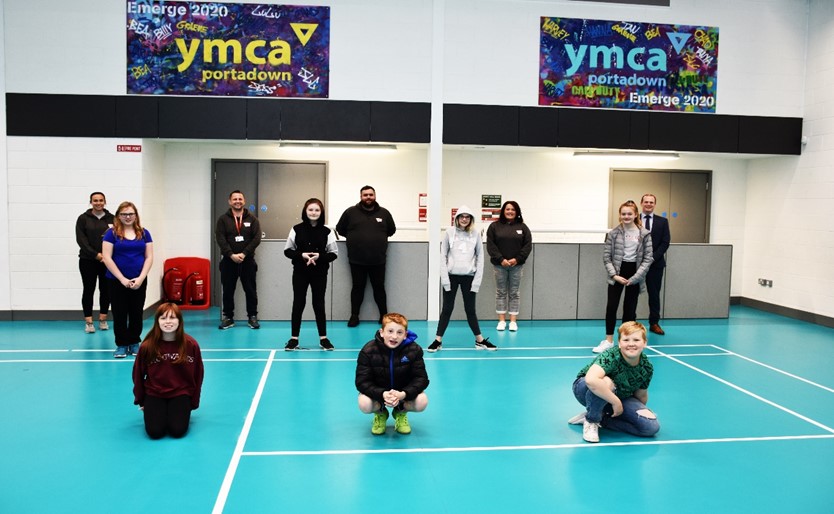
Over a six week period, the group met twice weekly, always adhering to public health guidance.
The programme included:
- sessions which had been designed to explore individual identity and encouragement of self-reflection through both creative and interactive means
- exploring differences and similarities as well as sharing information about each other in an energetic way
- media and culture awareness, graffiti workshops and Lambeg/Ulster Scots workshop, and
- a trip to Airtastic (Craigavon) to celebrate their learning and to socialise and have fun together.
In September 2020, Junior Minister Gordon Lyons visited Portadown YMCA to see at first hand the impact the Emerge project has had, both on the young people participating and also the local community.
The current pandemic is an issue that has had a massive impact on young people, and the group found it beneficial to discuss the issue with the Minister, as well as learning more about his role and what it involves on a day to day basis.
Programme impact
“It was amazing and I can’t wait until T:BUC”
“You learn new things about your culture and more about yourself”
Quotes from participants of the ‘Emerge’ project
Portadown YMCA commented:
“Portadown YMCA were pleased to welcome Junior Minster Lyons to meet with some of the young people involved in our Planned Intervention project. We appreciated the Minister taking the time to interact with the young people and involve himself in the activities.
“The Minister was very engaging and the young people enjoyed the experience. YMCA also welcomed the opportunity to highlight the success of the Planned Intervention funding scheme and we hope that the Minister recognised the huge impact a small amount of money can have on the lives of young people.”
Gavin King, Programme manager of the Planned Interventions Programme in TEO, remarked:
“The purpose of the Planned Interventions Programme is to address negative behaviour and reduce tensions.
“The project delivered by the YMCA is an example of the positive good relations outcomes that can be achieved when we work closely with delivery partners like EA and committed project leaders on the ground.”
TEO enables Lisburn YMCA’s SpotLight (intervention) Programme to shine a light on young people
Earlier this year, Lisburn YMCA secured funding from The Executive Office’s Planned Interventions Programme to deliver their ‘SpotLight Programme’.
The Planned Intervention Programme, delivered annually as part of the Executive’s wider Together: Building a United Community (T:BUC) Strategy, provides funding for community activity to divert young people from anti-social and potentially criminal behaviour around contentious parades and public assemblies, and to deal with heightened tension around interfaces during the summer period.
Participants on the SpotLight Programme were both male and female from the Lisburn area, a range of community backgrounds, and between 14-21 years of age.
Lisburn YMCA identified the young people by using detached youth work, recommendations from the local PSNI, and those who were most at risk and extremely vulnerable due to:
- Poor Mental Health
- Complex Family problems
- Trauma
- Drug & Alcohol misuse
- Criminal and Anti-social behavior
- Continually involved in risk taking behavior
- Communicating/acting upon their hatred to others from a different religious background, race of community.
- Negative opinions held on the PSNI influenced by their community, family and personal experiences.
The programme ran over four evenings and Saturday afternoons, for four weeks beginning on 20 August 2020 and finishing on Thursday 17 September.
It explored four core themes:
- Drugs & Alcohol
- Risk Taking behaviour workshops
- Mental Health
- Sectarianism
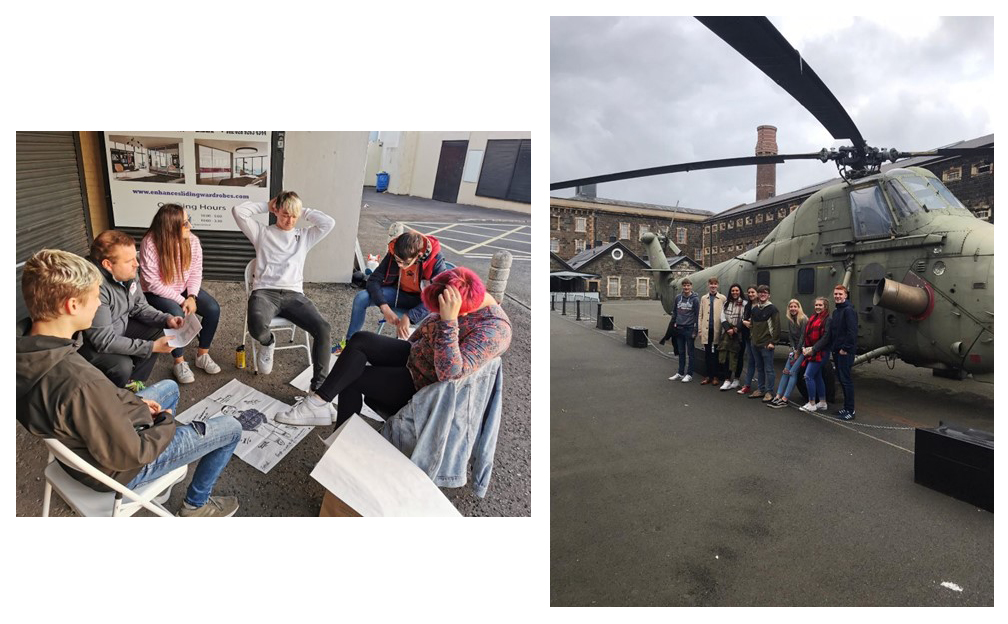
The project was designed to cater for all types of learners and to meet the needs of each individual in the group. The outcomes were delivered through the following mediums:
- Workshops (group activity) on the four core themes
- Personal Stories from recovering addicts, ex-prisoners and Mental health struggles
- Outdoor activities on Slieve Donard and Divis mountain.
- Educational visit to Crumlin Road Jail
- PSNI visiting and having dinner with the young people.
- Filming preventative materials to educate other young people from using drugs/alcohol and becoming involved in risk taking behaviours.
Programme impact
The completion of this programme had a positive influence on all the young people involved. This was evidenced in the direct quotes from the young people and through conversations with them, staff and the PSNI.
Quotes taken from Participants in the SpotLight Programme
“My perspective of the Police has changed for the better”
“I didn’t realise how many factors there are to stereotypes of different religions and beliefs”
“I knew about the types of drugs, but not about the consequences”
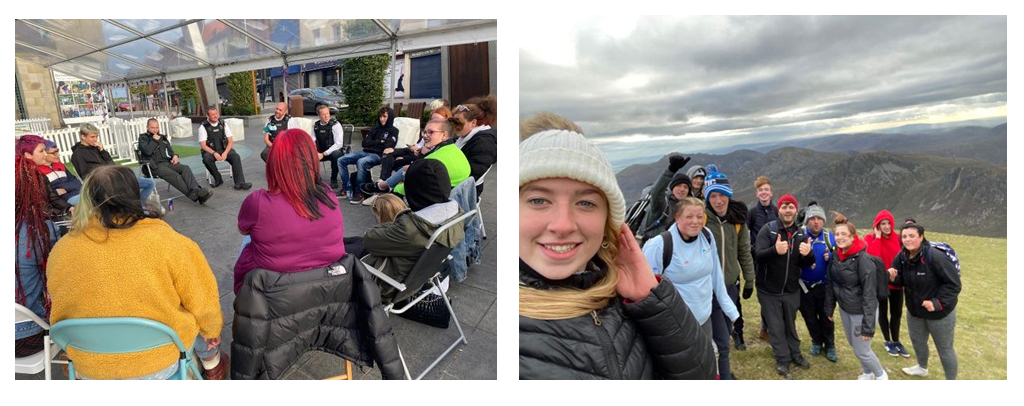
Project leaders found the behavioural sessions and visits from the PSNI and an ex-prisoner really resonated with the group.
The young people explained they didn’t realise how their actions can negatively impact their future, result in a criminal conviction, damage their relationships, and have long term effects on their health and future.
What next?
Lisburn YMCA now plan to integrate the young people from the SpotLight Programme into their main youth provision and work with them long term.
SpotLight has highlighted a number of areas of need for this particular group of young people and Lisburn YMCA feel it’s a natural progression to explore “life skills, homelessness prevention and a social action project” with this particular group.
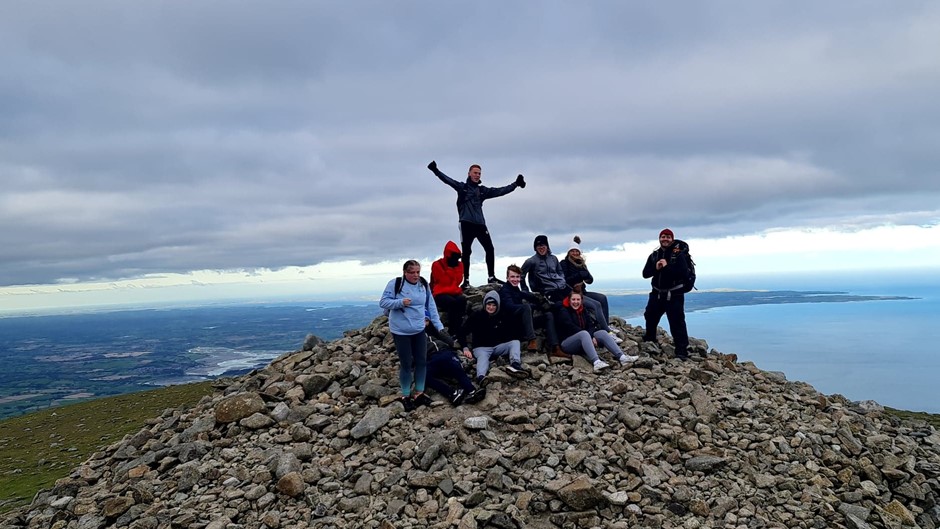
Quote from a participant on the SpotLight Programme:
“The first time I have ever been proud of myself was when I climbed Donard”
Chris Kane from T:BUC Camps & FICT Branch commented:
“The Planned Interventions Programme seeks to provide alternative activities for those young people in our society at risk of engaging in negative behaviours at times of tension.
“The Spotlight Programme is a great example of how these interventions can have significant positive impacts. I wish all the young people who took part all the very best for the future.”
TEO ensures Leafair young people ‘Don’t Burn Them, Turn Them’
Ten young males from the Leafair area of Derry~Londonderry participated in one of The Executive Office’s Planned Intervention Projects last Summer – this is their story.
“Don’t Burn Them, Turn Them” is one of 91 successful projects delivered across Northern Ireland to divert young people from anti-social and potentially criminal behaviour around contentious parades and public assemblies, and to deal with heightened tension around interfaces during the summer period.
The programme is delivered annually as part of the Executive’s wider Together: Building a United Community (T:BUC) Strategy and is administered by the Education Authority.
Leafair Community Association identified a need for the programme due to the anti-social and risk taking behaviour from young people around a bonfire site in the area. They secured T:BUC funding to deliver the ‘Don’t Burn Them, Turn Them’ project, and with the assistance of the local school and PSNI, 10 young men aged between 14-19yrs of age were identified and recruited to the programme.
Some were known to the PSN, or had been identified as vulnerable or at risk of involvement in anti-social and risk taking behaviours. The ‘Don’t Burn Them Turn Them’ Programme involved the participants attending their local Men’s Shed, an already established organisation where local men come together for friendship, share skills and knowledge.
Under the guidance of the men, the young people learned about the different tools in the workshop and assisted them in building furniture with pallets that would normally have been burning on their bonfire.
Quotes from participants:
"This is the first time I took part in something like this. I always thought it would be a waste of time, but it wasn’t. I’ve learned to do so many new things. I would like to work making things and become a joiner now, I think I will go back to school now."
"I was always in bother with the police, once they got to know me they were constantly at our door, my ma was going mad, but now since I have been coming here, they haven’t been bothering with me, probably cause I’m not getting into trouble and my ma is happy about that."
Impact of the Programme
Group leaders reported that participants on the programme became more involved within their community, taking part in clean ups and promoting the good work being carried out by both the Men’s Shed and themselves. They also advised there had been a noticeable decrease in anti-social behaviour in the community.
Quote from a participant:
"I want to help out with the younger lads in the estate, just to show them that it doesn’t have to be the way of getting into bother all they time just to be a big man. It’s better to make something of yourself and help people instead of annoying them all the time."
Quote from Group Leader:
"I have really noticed enormous change in the boys since the start of the programme, their attitudes have changed for the better, they are really interested in making different pieces of wood for their community. They are now feeling like more a part of their community and I hope it helps build for the time ahead."
Charlene Sharkey, from TEO’s Good Relations, F.I.C.T. & T:BUC Camps Branch said:
“It is great to see a Planned Intervention project, funded by the T:BUC Strategy, really making a difference to both the young people, and the community they live in.
“It is a great example of how the Planned Intervention Programme can divert young people from anti-social and potentially criminal behaviour, and empower them to make a positive difference to their own lives and the community they live in.”
If you would like to find out more about the Planned Interventions Programme, information is available via the link below:
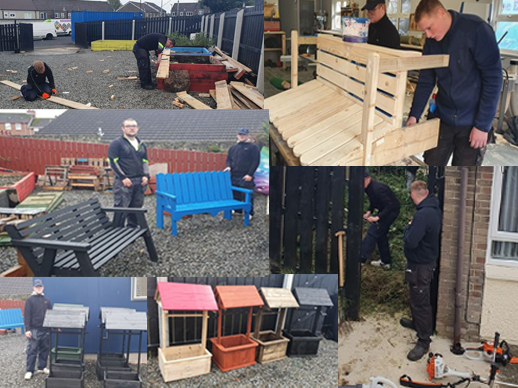
Changing for the better, together – one person’s journey in good relations
John* was a participant on a project funded by TEO’s Planned Interventions Programme.
Delivered annually as part of the Executive’s wider Together: Building a United Community (T:BUC) Strategy, the Programme provides funding to divert young people from anti-social and potentially criminal behaviour, and to deal with heightened tension around interfaces during the summer period.
This article outlines how John’s life has changed for the better following his engagement with the Planned Interventions Programme.
Before
Prior to participating on the project, John was well known to the PSNI and had a poor reputation among the residents of his local community. He did not readily engage with education or sports provision in the area. As a result, John found interacting with others socially difficult, and suffered from low self-esteem.
John was unsettled, and on occasion he was angry, aggressive, and disrespectful to others. He had been known to disregard his own safety and that of others, regularly engaging in anti-social behaviour within his local community.
It was John himself who had seen a post on social media from a local youth club advertising the programme. The fact that John chose to participate in the programme was a very positive step for him in its own right.
During
In the early stages of the project John struggled to find his place within the group dynamic, often attempting to be the loudest and most outspoken.
Over time his self-confidence grew, and he began to engage with the group more positively. He took pride in his successes, and he relished the positive feedback he received from others.
Initially having chosen to work alone during workshops, John’s increased self-confidence was marked by his increasing participation in group work activities and discussion based exercises. He began to engage positively with group facilitators, including PSNI neighbourhood officers.
After
John has undergone significant personal and social development as a result of his participation on the Programme. John has strengthened friendships amongst his peer group, and while challenges remain he is rebuilding his relationship with his local community.
He has expressed an interest in participating in further good relations projects, which will provide him with the opportunity to continue developing his self-esteem and self-confidence.
Quote from Youth Work Staff:
“It was good to see John’s development over the length of the programme going from not participating, to not only engaging, but leading group activities”
The project:
The project John participated on was made up of a group of 10 young people aged 14-16 years living in an area of high sectarian activity and anti-social behaviour. The group included participants from both of the main communities here.
The programme entailed:
- Team building activities
- Decision making workshops to explore:
- Risk taking
- Positive choices
- Community safety
- Diversity workshops exploring:
- Perceptions
- Prejudice
- Stereotypes
- PSNI Q&A session
- Night Safe workshop (facilitated by PCSP)
What difference did this project make to the young people participating on the same project as John?
- 100% recorded that the programme had increased their confidence and skills.
- 77% indicated they felt more favourable to those from a different religious background.
- 77% indicated they felt more favourable to those from a different ethnic background.
The Planned Interventions Programme is funded by The Executive Office and administered by The Education Authority.
*We have used a false name to protect the identity of the participant.
